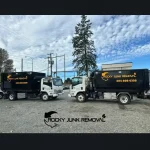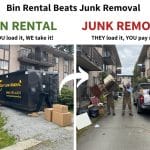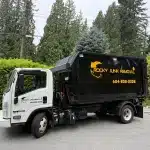When you are cleaning out a house in Vancouver or Burnaby, it is tempting to toss everything into a rental bin and be done with it. The problem is that many everyday items are actually banned from dumpsters because they are dangerous, toxic or need special handling. Putting the wrong thing in a dumpster can lead to extra charges, rejected loads and in some cases real safety risks.
This guide walks you through what you can’t put in a dumpster, why it is restricted and what to do instead when you book bin rental Burnaby or a similar service in Metro Vancouver. We will also show you when it is smarter to call Rocky Junk Removal, your local junk removal team in Vancouver and Burnaby, rather than wrestling with confusing rules on your own.

Why Some Items Are Banned From Dumpsters
Before we list specific items, it helps to understand the logic behind the rules.
Certain materials are restricted or completely banned from dumpsters because:
- They can leak and contaminate soil or groundwater
- They are flammable or explosive under pressure
- They expose landfill and collection workers to health risks
- They contain valuable materials that must be recycled instead of buried
Even if something is common in your home, the law may treat it as hazardous. Paint, batteries and old electronics are perfect examples. That is why it is always wise to check what is allowed before you start throwing things into a bin.
Household Hazardous Waste
Many of the worst offenders hide in garages, sheds and under kitchen sinks.
Chemicals, Paints and Solvents
Things like oil based paints, paint thinner, harsh cleaners, pesticides and herbicides should never go into a dumpster. These liquids can leak, mix with other waste, catch fire or release toxic fumes.
Most Metro Vancouver municipalities run household hazardous waste or product stewardship programs. You can drop off leftover paint, chemicals and similar products at designated depots instead of tossing them in the trash.
Automotive Fluids and Fuels
Used motor oil, gasoline, diesel, antifreeze, brake fluid and transmission fluid are all considered hazardous. They are flammable, they contaminate water and they are tightly regulated.
In practice, that means:
- Do not pour them down drains
- Do not pour them on the ground
- Do not put them in a dumpster
Many auto shops, recycling centres and depots accept automotive fluids for proper recycling or disposal.
Propane Tanks, Gas Cylinders and Aerosols
Pressurized containers are a serious hazard when they end up in a truck compactor or landfill. Even “empty” barbecue tanks and spray cans can explode under pressure or heat.
Full or partially full propane tanks, fire extinguishers, camp stove cylinders and many aerosols are not allowed in dumpsters. Most areas have special drop off points or exchange programs for these items.
Batteries and Mercury Containing Items
Car batteries, lithium batteries, rechargeable packs, fluorescent tubes and some older thermostats contain heavy metals like lead or mercury. These materials are recyclable but very toxic if they leak.
Instead of throwing batteries in the trash, use local battery recycling boxes at hardware stores, electronics shops or municipal depots.
Electronics and Appliances (E Waste)
Electronics are everywhere in modern homes, but they do not belong in a dumpster.
TVs, Computers and Small Electronics
Televisions, laptops, desktops, printers, phones and other small devices contain circuit boards, plastics and metals that are not meant to be landfilled. Many regions treat them as e waste, which must be recycled through approved programs.
In Vancouver and Burnaby you will find drop off locations and recycling events where you can leave old electronics at little or no cost.
Large Appliances and Refrigerated Units
Fridges, freezers, air conditioners and dehumidifiers contain refrigerants that must be removed by a certified technician. These are not suitable for normal dumpsters.
Other big appliances like stoves, washers and dryers are often handled as scrap metal instead. Some junk removal services in Vancouver and Burnaby will:
- Remove the appliance from your home
- Separate metal for recycling
- Arrange proper handling for any refrigerants
This saves you from trying to drag a 200 pound fridge across the driveway.
Bulky Items and Furniture (Including Mattresses)
Not everything big is automatically banned, but bulky items create their own set of issues.
When Large Furniture Is Restricted
Sofas, sectionals, wall units and massive office desks can exceed the weight or volume limits for standard dumpsters. Some bin providers charge extra for bulky items or limit how many pieces you can throw in.
Before loading your bin, it is smart to:
- Confirm what counts as “bulk” with the rental company
- Ask about extra fees for oversized furniture
If you have a whole apartment worth of furniture, a full service junk removal crew is often more cost effective than a single overloaded bin.
Can I Put a Mattress in a Dumpster?
Let us tackle the big search question directly: can i put a mattress in a dumpster?
In many cases, the honest answer is no or only with conditions and extra fees.
Mattresses are a problem because:
- They take up a lot of space in the landfill
- The springs can damage equipment
- Some landfills ban them entirely or charge a surcharge
- Infested or stained mattresses can spread pests and contamination
Instead of forcing a mattress into a dumpster in Vancouver or Burnaby, better options include:
- Mattress recycling programs where the fabric, foam and metal are separated
- Municipal large item pickup, if available in your area
- A junk removal company that specifically handles mattresses and follows local rules
A professional local crew can remove mattresses from tight hallways or basements and make sure they go to the right facility.
Box Springs, Bed Frames and Upholstered Items
Box springs are often treated similarly to mattresses. Bed frames made of metal are usually recyclable, while wooden frames may be accepted in some construction or bulk waste streams.
Upholstered furniture with lots of fabric and padding might be restricted in some areas or charged at a higher rate. Always check before loading your bin with recliners and giant armchairs.
Tires, Car Parts and Scrap Metal
Vehicle parts come with their own set of rules.
Can You Put Tires in a Dumpster?
Another common question: can you put tires in a dumpster?
Most of the time, the answer is no.
Tires are typically banned from landfills and standard dumpsters because they:
- Trap gases and float to the surface of landfill cells
- Are difficult to compact
- Pose a higher fire risk
- Can collect standing water and attract pests
Instead, tires should be taken to:
- Tire retailers that offer recycling when you buy new tires
- Auto shops that accept old tires for a fee
- Dedicated tire recycling depots
In many cases you already paid a recycling or eco fee when you originally bought the tire, so it makes sense to take advantage of the proper recycling path.
Car Parts, Batteries and Scrap Metal
Clean scrap metal often has value and can be taken to a metal recycler. Engine parts, oily components and batteries need more care and should never be tossed casually into a bin.
If you have a mix of car parts, batteries and old scrap in your driveway in Burnaby or Vancouver, a junk removal company that separates metal from hazardous items is usually the safest choice.
Construction Debris That Needs Special Handling
Renovations create many types of waste, but not all of them can go in a regular household dumpster.
Asbestos, Lead and Contaminated Materials
Older homes in Metro Vancouver may still have asbestos containing materials, lead paint or significant mold. These materials are not allowed in standard dumpsters and usually require licensed abatement contractors.
Signs you may need special handling include:
- Very old vinyl flooring or pipe wrap
- Popcorn ceilings from older renovations
- Heavy chipping lead based paint
- Moldy drywall or insulation after a leak
If you suspect any of these, stop and call a qualified professional. Tossing asbestos or lead contaminated debris into a dumpster can create legal and health problems.
Dirt, Concrete and Heavy Inert Materials
Soil, concrete, brick and asphalt are extremely heavy. Most dumpster services have separate “clean fill” or “concrete only” bins, and there are strict weight limits to keep trucks safe.
Overloading a bin with heavy material can:
- Make the bin too heavy to pick up
- Lead to overweight charges
- Damage driveways or lanes
Ask your provider what type of bin you need if you are removing a patio, driveway or large amounts of soil.
Roofing Materials and Treated Wood
Shingles, tar paper and pressure treated lumber may be restricted or billed at higher rates at some landfills. In many cases they can go in a construction focused dumpster, but you should confirm first so there are no surprises on your invoice.
Medical, Biological and Confidential Waste
Some things should never be mixed with general waste for safety and privacy reasons.
Needles, Sharps and Medical Supplies
Used needles, lancets, syringes and similar “sharps” are dangerous for everyone who handles garbage. They must never be thrown loose into a dumpster.
Instead, place sharps in approved containers and use pharmacy take back programs or medical waste services. Your local health authority or pharmacy can point you to safe options.
Medications, Biological Waste and Sensitive Documents
Expired or unused medications should not be dumped in the trash or flushed down the toilet. Many pharmacies in Vancouver and Burnaby accept them for safe disposal.
Bio waste like blood soaked materials or clinical waste must follow medical guidelines, not household trash rules.
Even things like tax returns and documents with personal information are better shredded before disposal to protect your identity.
Yard Waste and Organic Material
Green waste rules vary by municipality, but it is worth a quick check.
In some areas, leaves, branches and grass clippings are banned from regular landfills because they are meant for composting or dedicated green waste streams. Large amounts of food waste can also create strong odours and attract animals in and around dumpsters.
Instead, use:
- Curbside green bins where available
- Municipal yard waste depots
- Backyard composters for suitable materials
A junk removal team can also haul away bagged yard waste or branches as part of a clean up.
Items That May Be Allowed With Conditions
There is a gray zone of items that might be allowed if they are prepared correctly or if your dumpster agreement allows them.
Examples include:
- Completely empty and dry paint cans with no liquid left inside
- Small amounts of non hazardous household junk
- Furniture that is broken down into smaller parts
The key is to read your rental contract, look for the “prohibited items” list and call the provider if you are unsure. A five minute phone call is much cheaper than a rejected load fee.
What To Do With Items You Can’t Put in a Dumpster
Knowing the rules is helpful, but you still need practical solutions.
Here are common options for items that cannot go in a dumpster:
- Household hazardous waste depots for paint, chemicals and fuels
- Electronics recycling programs for TVs, computers and small devices
- Appliance recycling and removal services for fridges, stoves and washers
- Mattress and tire recycling centres for the big, awkward items
- Charities and reuse centres for furniture that still has life left in it
- Professional junk removal services for mixed loads when you do not want to sort everything yourself
If you live in Vancouver or Burnaby and you are staring at a garage full of “problem” items, calling a local junk removal team like Rocky Junk Removal can be the easiest route. A good crew will:
- Load everything for you
- Separate recyclables, donations and trash
- Follow Metro Vancouver disposal rules
- Keep you away from surprise landfill fees
You get your space back without having to become an expert in waste regulations overnight.
Conclusion: Plan Before You Toss
A dumpster is a powerful tool for big cleanups, but it is not a free for all. Items like chemicals, electronics, mattresses, tires, medical waste and asbestos related materials usually need special handling.
Before you rent a bin or start dragging heavy items down the stairs, take a moment to check what you cannot put in a dumpster and what your city expects you to do instead.
For homeowners and businesses in Vancouver and Burnaby, partnering with a local junk removal service is often the simplest, safest and most cost effective way to clear out clutter, stay on the right side of the rules and keep as much material as possible out of the landfill.







